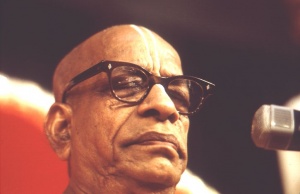CC Antya 17.45: Difference between revisions
m (1 revision(s)) |
No edit summary |
||
| Line 1: | Line 1: | ||
{{ | [[Category:Sri Caitanya-caritamrta - Antya-lila Chapter 17|C045]] | ||
<div style="float:left">'''[[Sri Caitanya-caritamrta|Śrī Caitanya-caritāmṛta]] - [[CC Antya|Antya-līlā]] - [[CC Antya 17|Chapter 17: The Bodily Transformations of Lord Śrī Caitanya Mahāprabhu]]'''</div> | |||
<div style="float:right">[[File:Go-previous.png|link=CC Antya 17.44|Antya-līlā 17.44]] '''[[CC Antya 17.44|Antya-līlā 17.44]] - [[CC Antya 17.46|Antya-līlā 17.46]]''' [[File:Go-next.png|link=CC Antya 17.46|Antya-līlā 17.46]]</div> | |||
{{CompareVersions|CC|Antya 17.45|CC 1975|CC 1996}} | |||
{{RandomImage}} | |||
==== TEXT 45 ==== | ==== TEXT 45 ==== | ||
<div | <div class="verse"> | ||
se amṛtera eka-kaṇa, karṇa-cakora-jīvana, | :se amṛtera eka-kaṇa, karṇa-cakora-jīvana, | ||
karṇa-cakora jīye sei āśe | :karṇa-cakora jīye sei āśe | ||
bhāgya-vaśe kabhu pāya, abhāgye kabhu nā pāya, | :bhāgya-vaśe kabhu pāya, abhāgye kabhu nā pāya, | ||
nā pāile maraye piyāse | :nā pāile maraye piyāse | ||
</div> | </div> | ||
| Line 14: | Line 18: | ||
==== SYNONYMS ==== | ==== SYNONYMS ==== | ||
<div | <div class="synonyms"> | ||
se | ''se amṛtera''—of that nectar; ''eka-kaṇa''—one particle; ''karṇa-cakora''—of the ear, which is like a ''cakora'' bird; ''jīvana''—the life; ''karṇa''—the ear; ''cakora''—the ''cakora'' bird; ''jīye''—lives; ''sei āśe''—with that hope; ''bhāgya-vaśe''—by good fortune; ''kabhu''—sometimes; ''pāya''—gets; ''abhāgye''—by misfortune; ''kabhu''—sometimes; ''nā pāya''—does not get; ''nā pāile''—if does not get; ''maraye''—dies; ''piyāse''—from thirst. | ||
</div> | </div> | ||
| Line 21: | Line 25: | ||
==== TRANSLATION ==== | ==== TRANSLATION ==== | ||
<div | <div class="translation"> | ||
"One particle of that transcendental, blissful nectar is the life and soul of the ear, which is like a cakora bird that lives in hope of tasting that nectar. Sometimes, by good fortune, the bird can taste it, but at other times he unfortunately cannot and therefore almost dies of thirst. | |||
</div> | </div> | ||
__NOTOC__ | |||
<div style="float:right; clear:both;">[[File:Go-previous.png|link=CC Antya 17.44|Antya-līlā 17.44]] '''[[CC Antya 17.44|Antya-līlā 17.44]] - [[CC Antya 17.46|Antya-līlā 17.46]]''' [[File:Go-next.png|link=CC Antya 17.46|Antya-līlā 17.46]]</div> | |||
__NOTOC__ | |||
__NOEDITSECTION__ | |||
Revision as of 11:59, 24 September 2021

A.C. Bhaktivedanta Swami Prabhupada
TEXT 45
- se amṛtera eka-kaṇa, karṇa-cakora-jīvana,
- karṇa-cakora jīye sei āśe
- bhāgya-vaśe kabhu pāya, abhāgye kabhu nā pāya,
- nā pāile maraye piyāse
SYNONYMS
se amṛtera—of that nectar; eka-kaṇa—one particle; karṇa-cakora—of the ear, which is like a cakora bird; jīvana—the life; karṇa—the ear; cakora—the cakora bird; jīye—lives; sei āśe—with that hope; bhāgya-vaśe—by good fortune; kabhu—sometimes; pāya—gets; abhāgye—by misfortune; kabhu—sometimes; nā pāya—does not get; nā pāile—if does not get; maraye—dies; piyāse—from thirst.
TRANSLATION
"One particle of that transcendental, blissful nectar is the life and soul of the ear, which is like a cakora bird that lives in hope of tasting that nectar. Sometimes, by good fortune, the bird can taste it, but at other times he unfortunately cannot and therefore almost dies of thirst.